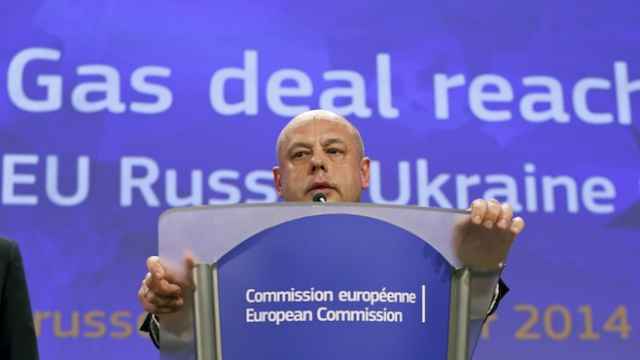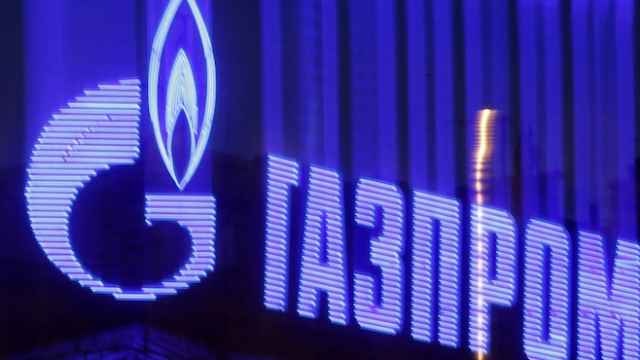LONDON — The sticking plaster Russia-Ukraine gas payment deal will unpeel in March with the intensity of the likely next dispute dependent on a judgement from a legal panel in Sweden.
The potential is there for a far more tangled dispute next year as unresolved issues resurface on the question of payment that determines gas supply for Ukraine and onward to Europe.
Last week, talks between Russia and Ukraine brokered by the European Commission led to a temporary agreement on a gas price, a debt repayment schedule and a resumption of gas supplies until the end of March — a fix to the disagreement over a 2009 bilateral supply contract.
No one knows the price Ukraine will pay for Russian gas from March. Nothing about summer prices was included in last week's deal.
"The two parties and the EU will face the same problems that led to the supply cutoff this past June," said Alex Brideau, senior analyst at political risk consultancy Eurasia Group.
Concerns center on whether the deal will be upheld, the impact of any wider conflict over eastern Ukraine and how the arbitration tribunal will settle long-term price issues between the two parties.
"Europe has gained security of transit via Ukraine in 2014, but 2015 is still open to question. We still fear some possible disruption in Q1 2015," said Thierry Bros, European gas analyst at French bank Societe Generale.
Both Ukraine's Naftogaz and Russia's Gazprom have lodged cases with the Arbitration Institute of the Stockholm Chamber of Commerce, which resolves commercial agreement disputes, to review their gas transit contracts.
Naftogaz hopes to recover $6 billion in alleged over-payments, while Gazprom wants to recover $4.5 billion in debt. Any outcome is not expected until towards the end of next year.
"Resolution of the broader disagreement depends on how the Stockholm arbitration court rules on their claims, and how the two parties react to those rulings," Brideau said.
A further risk is that Ukraine uses up its stored gas this winter and then needs to buy at least another 12 billion cubic meters by October 2015 to prepare for next cold season, said Jonathan Stern, chairman of the Natural Gas Research Program at the Oxford Institute for Energy Studies.
"The tribunal will not have reported by then so pricing will still a problem," he said.
A Well-Worn Pattern
Previous gas agreements between Russia and Ukraine have not been long-lived.
In 2006, after Russia cut off gas supplies in a dispute over payments, a preliminary agreement was also reached which restored supply. However, new disputes began over Ukraine's gas debt the following year, which led to a reduction in supplies in 2008.
Russia and Ukraine could not agree on the amount of debt owed and by 2009, the dispute had resulted in supply disruptions in many European countries. The EU receives about a third of its gas from Russia and about half of that is piped across Ukraine.
On Wednesday, Gazprom said it had received the first tranche of debt payment from Naftogaz.
Although gas traders in Europe breathed a sigh of relief at the signing of the deal, reflected in falls in European wholesale gas prices, there are still doubts about supply after the contract expires in March.
The wider conflict between Russia and Ukraine in eastern Ukraine continues and could also escalate, following rebel elections in the Donetsk and Luhansk regions at the weekend.
"The broader political crisis will continue to create risks of supply disruptions in the coming months," Brideau said.
A Message from The Moscow Times:
Dear readers,
We are facing unprecedented challenges. Russia's Prosecutor General's Office has designated The Moscow Times as an "undesirable" organization, criminalizing our work and putting our staff at risk of prosecution. This follows our earlier unjust labeling as a "foreign agent."
These actions are direct attempts to silence independent journalism in Russia. The authorities claim our work "discredits the decisions of the Russian leadership." We see things differently: we strive to provide accurate, unbiased reporting on Russia.
We, the journalists of The Moscow Times, refuse to be silenced. But to continue our work, we need your help.
Your support, no matter how small, makes a world of difference. If you can, please support us monthly starting from just $2. It's quick to set up, and every contribution makes a significant impact.
By supporting The Moscow Times, you're defending open, independent journalism in the face of repression. Thank you for standing with us.
Remind me later.





